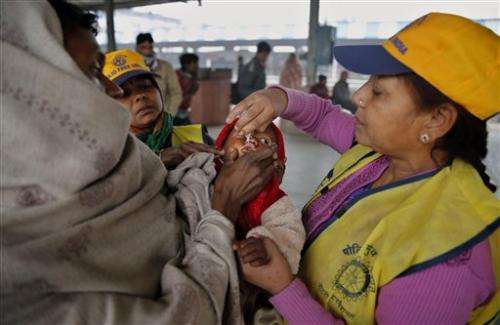An Indian medical volunteer administers polio immunization drops to a child at a railway station in Allahabad, India, Monday, Jan. 13, 2014. India on Monday marked three years since its last polio case was reported, a major milestone in eradicating the crippling disease. (AP Photo/Rajesh Kumar Singh)
India marked three years Monday since its last reported polio case, putting the country on course to being formally declared free of the disease later this year.
India has made great strides against polio in recent years through a rigorous vaccination campaign. But for many in India, where polio victims with withered, twisted limbs are a common sight on the streets, these advances have come too late.
"My parents were very poor and couldn't afford medical treatment for me," said Sonu Kumar, 24, who contracted the disease when he was 10. Paralyzed from the waist down, he begs outside a temple in central Delhi and uses a wheelchair to move around.
Polio is a vaccine-preventable disease that has been eradicated in most countries. But it still causes paralysis or death in some parts of the world, including Nigeria, Pakistan and Afghanistan.
Polio usually infects children under age 5 when they drink contaminated water. The virus attacks the central nervous system, causing paralysis, muscular atrophy, deformation and, in some cases, death.
"India was once thought to be the most difficult country in which to achieve polio eradication," Global Polio Eradication Initiative said in a statement.
Monday's milestone was significant, but the World Health Organization stills need to confirm there are no undetected cases before making the official declaration that India is polio-free in March.
Still, Junior Home Minister R.P.N. Singh sent a triumphant message on Twitter: "Proud day for all of us as Indians ... India is polio free for three years."
Widespread poverty, dense population, poor sanitation, high levels of migration and a weak public health system made the task of reaching out to every child under age 5 that much more difficult.
An army of nearly 2.5 million volunteers, doctors and medical workers carried out a campaign across the country to vaccinate children over three years to wipe out the scourge. The number of polio cases came down from 741 in 2009 to 42 in 2010.
The last case of polio was reported in eastern India in 2011.
In 2012, WHO removed India from a list of countries with active endemic wild polio transmission after it passed one year without registering any new cases.
Health officials remained concerned about the possibility of the virus entering the country from neighboring Pakistan. Indian health authorities have set up polio immunization booths at the two border crossings with Pakistan and all children who enter by road and train are being given vaccines.
Mithlesh Devi, 27, who contracted the disease when she was 1 year old, said she has never known a normal life in India but has hopes for her family's future.
"I have ensured that my daughters do not meet the same fate," said Devi, who begs for money outside Hindu temples in New Delhi. "I got them polio drops at the right age. I am not happy with my tough life. But I have no choice."
© 2014 The Associated Press. All rights reserved.



















